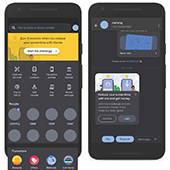Digital wellbeing is gaining increasing importance as it focuses on designing technology that should empower the user to help improve their lives. This project aims to explore digital wellbeing strategies to help people address problematic digital behaviours, manage distractions and improve their autonomy around how they spend their time.
Technology is ubiquitous and a large part of our lives makes use of screens to support the user’s productivity, connectivity and leisure. Constant distractions from primary tasks increase the user’s screen time affecting their physical and mental health. These distractions are a result of how applications are designed to engage or hook the user into losing track of time, low self-control, frustration, guilt and post-use regret. While some users are aware of their excessive usage, a few do not identify the effects of wasted time. ‘Time is the currency’ when it comes to distractions on our digital devices as it is easiest to start using these applications but difficult to understand ‘how much is enough?’. To combat these negative experiences and digital behaviours, digital wellbeing plays an integral role in devising solutions that help users manage how they engage with technology.
A variety of digital wellbeing interventions exist but only work for temporary periods of time or are easily bypassable. This project aimed to build upon other less-explored approaches through a robust list of ideas accounting for user contexts of device use and routines. This project designed and evaluated three design interventions that aid users in managing the time they spend on their devices by employing a combination of strategies identified from literature and primary research insights. As a result of the designs, we were able to gain insights on (1) the impact of redirecting users to diverse alternate activities of interest to reduce social media usage (2) the effects of modifying the environment on routine digital behaviors (3) the role of financial rewards/penalties to motivate users to self-regulate screen-time. We believe, insights from these explorations may be further taken forward to help with technology-related addictive behaviors and support subjective wellbeing within unique user contexts.
Case Study Download:
• Exploring Digital Wellbeing Strategies......


